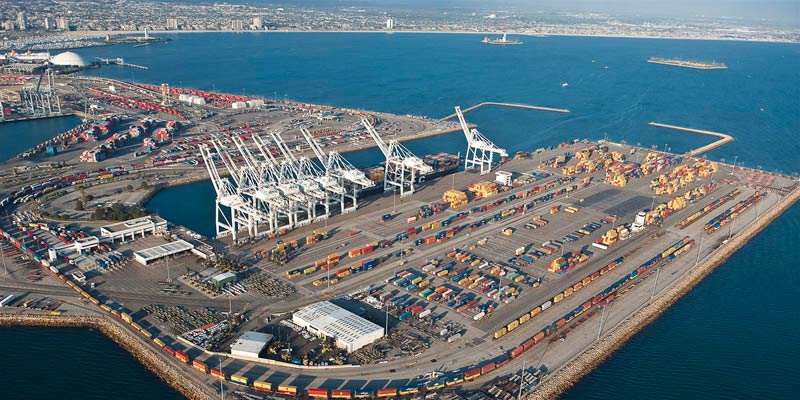
The theme of “back to normal” season patterns for United States-bound consumer goods may be ready to take hold in early 2020, following an even 2019 that was riddled with atypical trends and volumes related to the U.S.-China trade war and related tension. That was the word from the most recent edition of the Port Tracker Report, which was issued today by the National Retail Federation (NRF) and maritime consultancy Hackett Associates.
The ports surveyed in the report include: Los Angeles/Long Beach, Oakland, Tacoma, Seattle, Houston, New York/New Jersey, Hampton Roads, Charleston, and Savannah, Miami, Jacksonville, and Fort Lauderdale, Fla.-based Port Everglades.
Authors of the report explained that cargo import numbers do not correlate directly with retail sales or employment because they count only the number of cargo containers brought into the country, not the value of the merchandise inside them, adding that the amount of merchandise imported provides a rough barometer of retailers’ expectations.
This report comes in advance of the White House poised to sign the long-awaited Phase One trade deal with China on January 15 after saying it would lower tariffs that went into effect in September and cancelled another round that was originally slated to go into effect on December 15, while other tariffs remain in place.
“We’ll be more confident after we see the Phase One agreement signed, but right now 2020 looks like it should be back to what used to be normal,” NRF Vice President for Supply Chain and Customs Policy Jonathan Gold said in a statement. “We’ve been through a cycle of imports surging ahead of expected tariff increases – some of which got delayed, reduced or canceled – and falling off again afterward. That’s not good for retailers trying to manage their inventory levels or trying to make long-term business plans. And tariffs are never good for consumers, businesses or the economy.”
U.S. reports covered in the report handled 1.67 million Twenty-Foot Equivalent Units (TEU) in November, the most recent month for which data is available, falling 11.2% compared to October (traditionally the busiest month of the year) and down 7.5% annually. The report observed that because of the uneven status and progress of trade talks reported in the fall, coupled with other shipping-related factors, a surge in advance of the cancelled December tariff increase did not come to fruition.
The report pegged December at 1.17 million TEU, off 13.4% annually from uncommonly high volumes in December 2018, which was driven by retailers pulling forward, or “front loading” imports ahead of a scheduled January 1, 2019 tariff hike that was eventually postponed. January is expected to be down 5% to 1.8 million TEU, and February is expected to fall 4.9% to 1.54 million TEU. March is expected to pick up, with a 5.2% gain to 1.7 million TEU, with the report indicating those last two months are connected to fluctuations in the Lunar New Year calendar and related factory shutdowns in Asia.
Hackett Associates Founder Ben Hackett wrote in the report that the combination of reduced output counterbalanced by increased inventory underlies the uncertainties of the tariff wars for imports and exports.
“It is not surprising that even the Federal Reserve suggests that the impact of the trade war has a negative impact on the US economy,” he wrote. “Expanding that economic strategy to Europe will make matters worse in 2020. Many retailers are passing on the cost impact of tariffs on imports, which will increasingly hit consumers in 2020. There is little benefit in the government revenue from tariffs, which is being squandered on higher subsidies for agribusiness with only a small number of players reaping the benefits.”









